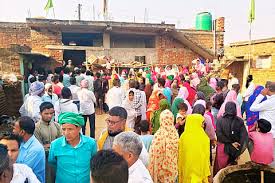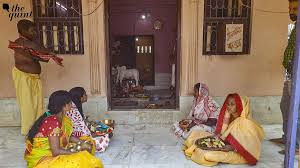In Tamil Nadu ruled by ‘anti-Sanatana Dharma’ DMK, Dalits continue to face crimes, discrimination

The Dravidian movement may claim to have brought self-respect back to the oppressed communities in Tamil Nadu, but Dalits continue to face oppression and social ostracization.
Written By: KV Ramesh | Edited By: Ramkumar
The name Usilampatti carries a stigma. Three decades ago, villages in the block of the name in Madurai District of Tamil Nadu became infamous after the media reported how female infants were killed at birth by parents or close relatives by strangling them or feeding them poison. That horrific tragedy was trivialized in a catchy song composed by AR Rahman for the movie “Gentleman”, sung by the late Shahul Hamid and Swarnalatha that fantasized about a girl from the notorious taluk, where female children were sentenced to death at birth.
And now the name Usilampatti has risen again like phoenix from the ashes of its infamy, and this time it is a village of the same disreputable name in Thoothukudi District. A News9 report speaks about upper caste families’ reluctance to let their children partake in breakfast at a government school at the village where a Dalit woman prepares the morning snack for children under a scheme introduced by Chief Minister MK Stalin.
The century-old self-respect movement in Tamil Nadu that evolved into a Dravidian philosophy that placed the non-upper caste communities at its centre, and which turned political and eventually brought the Dravida Munnetra Kazhagam to power, has not done much for the Dalits. The radical social transformation that Periyar and CN Annadurai sought never came about.
Tamil Nadu has had a history of atrocities against Dalits, the most horrific of them being the Keezhavenmani massacre in Nagapattinam District in 1968, during the first DMK ministry. The infamous massacre was perpetrated on the night of Christmas, and saw 44 landless labourers belonging to Arundhatiyar and Paraiyar communities, unionized by the CPI(M), who were agitating for higher wages, being burned alive, shot and hacked to death by upper caste landlords for whom they worked. There have been other atrocities including the 1978 Villupuram massacre of 12 Dalits and burning of houses of SCs, the 1997 Melavalavu killing of six Dalits by upper castes, who refused to accept an elected panchayat president belonging to the SC community.
While the Brahmins in Madras state, as it was known before it became Tamil Nadu, exercised social power, and treated Dalits as untouchable and refused them entry into temples and even Brahmin Agraharas, the empowered middle castes that gained social and political power, that have perpetrated physical violence on the vulnerable.
The Dravidian movement marginalized Brahmins and empowered the middle castes such as Thevars or Mukkulathors, Vanniyars and Gounders, but Dalit castes such Paraiayars and Arundhatiyars remain outside the realm of power. The attempt by the Centre to impose Hindi in the 60’s distracted the Dravidian movement from its social revolution goals, and the DMK became focused on Tamil language and culture, rather than social upliftment.
The split in the DMK, leading to the offshoot of AIADMK, weakened the self-respect movement, as the fundamental question of empowering the disempowered was sidelined by the political tussle between Karunanidhi and MGR. The ascension of J Jayalalithaa, MGR’s protégé, turned AIADMK into a welfarist party rather than a social reformist party, which it never even pretended to be. The DMK, trying to compete with its rival politically for the support of the backward castes became equally populist, discarding its radical garb, and became a run-of-the-mill middle-of-the-road Indian political party, far away from its social revolutionist objectives.
Occasionally, the DMK seems to wake up to its original ideals, and tries to pay lip service to it, like appointing non-Brahmin archaks in temples under government control, but such moves have been criticized as regressive, and pushing back Dalits into the arms of Hindu priesthood.
It is such warped understanding that has kept Dalits in Tamil Nadu at the lowest levels of socio-economic scale in the southern state. Tamil Nadu has among the states with the worst record of anti-Dalit violence. According to Centre’s statistics given out in Parliament, 38 of 39 districts in Tamil Nadu have witnessed chronic violence against Scheduled Castes. A cursory look at the National Crime Records Bureau (NCRB) statistic bears out that uncomfortable truth the state will have to look in the face.
According to NCRB figures in its last report released in 2021, crimes against Scheduled Castes in Tamil Nadu show an upward graph over the last three years. Number of crimes/atrocities against SCs rose from 1,144 in 2019 to 1,274 in 2020, and in 2021, the figure rose further to 1,377 in 2021. Crimes against SCs constituted 9.5 per cent of the total cases of crimes.
Given the rise of atrocities against Dalits, in March this year, Governor RN Ravi expressed his concern that the violence against the vulnerable communities continued even when there was “talking so much social justice”, in an oblique attack on the DMK. Nor surprisingly, the governor, who is at loggerheads with the MK Stalin government, made his remarks at a function of a release of a book on prime minister Narendra Modi.
But that aside, the DMK has to answer much on its failure to deliver on its promise of social justice. With the BJP targeting it through various stratagems, including trying to attract various Dalit castes, mainly the Devendra Kula Vellalars (Arundhatiyars) to its fold, the Dravidian party may have to rediscover its passion for social justice, and avoid more Usilambpattis, in order to maintain its hold on the Tamil masses.
Courtesy : News Nine
Note: This news piece was originally published in newsnine.com and used purely for non-profit/non-commercial purposes exclusively for Human Right







